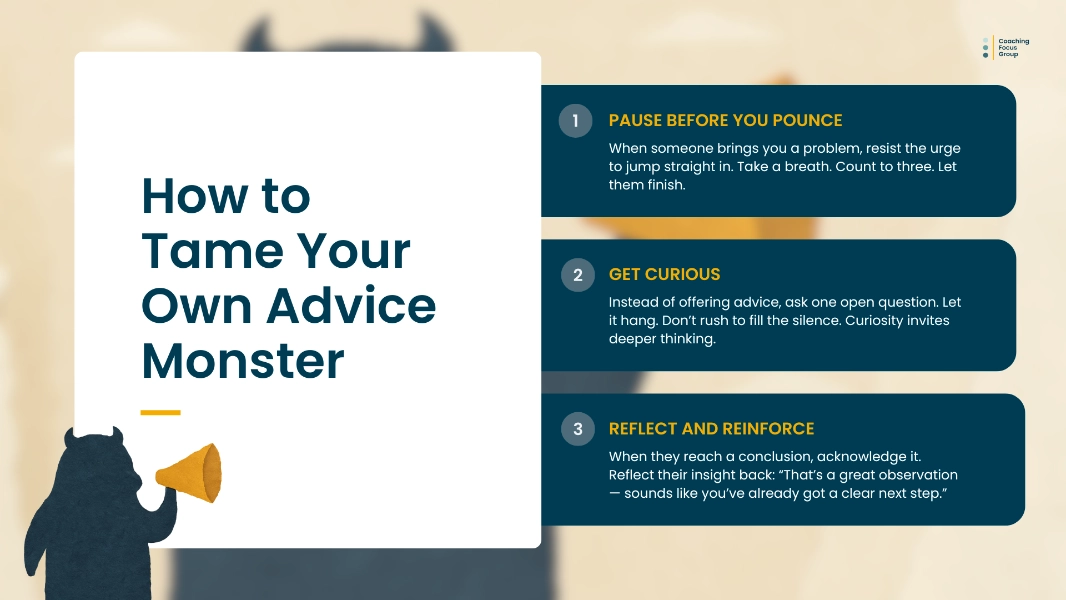Taming the Advice Monster: Why Great Leaders Talk Less and Coach More

Ever notice how quickly you jump in with advice? Someone on your team brings a challenge, and before they’ve even finished explaining, you’re already solving it in your head. You’ve got experience. You’ve seen it before. You want to help.
That instinct feels productive — dare I say even generous. But it’s also the reason many leaders unknowingly stunt growth in their teams. The moment we leap in with a fix, we feed the Advice Monster.
Meet the Advice Monster
Coined by Michael Bungay Stanier, the Advice Monster appears every time we can’t resist giving a solution.
It’s that voice whispering:
“Say something clever. Prove your worth. Show them you know.”
It’s seductive. You feel useful. The conversation moves fast. People seem grateful. But over time, this habit quietly reshapes the dynamics between you and your team.
Because when you lead by answering, not by asking, you become the centre of every decision. Your team stops thinking for themselves. They look to you for direction, approval, validation. Eventually, they stop believing they can solve their own problems at all.
The Hidden Cost of Constant Advice
Let’s be clear — advice isn’t bad. It’s just badly timed. When offered too soon, it steals the chance for someone else to reflect and explore. It fills the air with your thoughts, not theirs.
And when this pattern repeats, something corrosive happens:
- Conversations become one-sided.
- People learn to wait for your answers instead of finding their own.
- Confidence slowly erodes.
"...advice isn’t bad. It’s just badly timed."
This creates a “just tell me” culture. Teams lose their spark for problem-solving. Leaders burn out from constant decision-making. And creativity, that vital ingredient of innovation, gets smothered under layers of good intentions.

The Coaching Shift: From Fixer to Think Partner
Coaching flips this dynamic. Instead of rushing to fix, coaching invites curiosity. It’s about creating a space where people can think for themselves, not by themselves.
A coaching-led leader doesn’t hoard wisdom. They unlock it in others. They ask thoughtful, open questions that spark reflection:
- “What’s really going on here for you?”
- “If you could try anything, what would you do?”
- “What’s one small step you could take right now?”
These questions do more than uncover solutions. They send a message — I trust you to find the answer. And that trust fuels confidence, ownership, and growth.
How to Tame Your Own Advice Monster
Taming the Advice Monster isn’t about silencing yourself forever. It’s about awareness and balance. Try this simple three-step approach:
- Pause before you pounce.
When someone brings you a problem, resist the urge to jump straight in. Take a breath. Count to three. Let them finish. - Get curious.
Instead of offering advice, ask one open question. Let it hang. Don’t rush to fill the silence. Curiosity invites deeper thinking. - Reflect and reinforce.
When they reach a conclusion, acknowledge it. Reflect their insight back: “That’s a great observation — sounds like you’ve already got a clear next step.”
These small shifts might feel slow at first. But over time, they compound. You’ll notice more initiative, more engagement, and more genuine problem-solving across your team.

Taming the Advice Monster: Example In Action (Scenario)
Sometimes it helps to see the difference. Here’s a simple script that reveals what happens when the Advice Monster jumps in, compared with what it looks like when you’ve tamed it.
Scenario
A team member, Sam, comes to their manager, Alex, with a challenge about a project that’s running behind schedule.
Version 1: Advice Monster in Full Force
Sam: I’m a bit stuck on the rollout. The timelines keep slipping and I’m not sure what to prioritise next.
Alex: Right. Here’s what you need to do. Push the testing phase back. Get design to redo the assets. Then chase the vendor today. That should sort it.
Sam: Oh. Okay. Yes. I’ll do that.
Alex: And make sure you copy me into everything. I want to keep a close eye on this.
Sam: Sure. I will.
Alex: Good. Let me know if anything else crops up. I’ve seen this a thousand times.
What’s happening here?
Alex swoops in. Sam switches off. Ownership evaporates. The Advice Monster feels thrilled. The team feels smaller.
Version 2: Advice Monster Tamed
Sam: I’m a bit stuck on the rollout. The timelines keep slipping and I’m not sure what to prioritise next.
Alex: Thanks for bringing this to me. What feels like the real challenge underneath all of this for you?
Sam: Honestly. I think I’m trying to keep everyone happy. And it’s slowing me down.
Alex: That makes sense. If you were to focus on just one thing this week. What would move the project forward the most?
Sam: I suppose getting clarity from the vendor. Everything else depends on that.
Alex: Sounds like you’ve already decoded the next step. What will help you secure that clarity?
Sam: A quick call with them. Not another email chain. I can do that today.
Alex: Brilliant. Let me know how it goes. You’ve got this.
What’s happening here?
Alex slows the pace. Sam thinks for themselves. Confidence rises. Ownership returns. The advice stays on the shelf until the right moment.
The Real Payoff
Here’s the irony: the less you advise, the more effective your advice becomes. When people come to you having already thought deeply, they’re ready for perspective — not prescription.
Your words land differently. They carry weight. Because they’re offered at the right moment, to someone who feels capable, not dependent.
And that’s what great leadership is: not holding all the answers, but creating an environment where answers can emerge.
So, the next time your Advice Monster perks up, pause. Smile. Let it growl quietly in the corner. Then, ask the question that lets someone else shine.
Because taming your Advice Monster doesn’t make you less of a leader — it makes you the kind people want to follow.
FAQs About Taming the Advice Monster
1. What is the Advice Monster?
It is the part of you that wants to jump in with answers before someone has even finished talking. It feels useful, but it gets in the way of real learning and ownership.
2. Why is giving advice too early a problem?
It takes the thinking away from your team. They start relying on you for every answer and lose confidence in their own problem solving. You become the centre of everything and they stop growing.
3. How can I stop myself from jumping straight to advice?
Pause. Let the other person finish. Ask one open question instead of offering a solution. Give them space to think. It will feel slower at first, but it pays off quickly.
4. What does a coaching response look like?
It sounds like curiosity. Instead of saying what to do, ask something like, “What feels like the next step for you?” You help them find their own answers rather than filling the space with yours.
Taming the Advice Monster — Why Great Leaders Talk Less and Coach More
Most leaders jump in with advice far too quickly. It feels helpful, but it quietly shuts down thinking and confidence in your team. This article shows you how to tame that habit and shift from fixing to coaching. The big takeaway is simple. When you talk less and get curious, your team grows faster and trusts themselves more.
Trayton Vance
Trayton Vance is the Founder and Managing Director of Coaching Focus Group, one of the UK’s leading leadership coaching consultancies working with clients such as McDonalds, Beats by Dre, Paramount and many more.
Coaching Focus Group
Specialists in leadership coaching, workplace coaching programmes, and building coaching cultures that stick.
[FREE WEBINAR]
Feb 19 from 12pm to 1pm GMT

You might be interested in...


Employee Engagement Series




.jpg)







